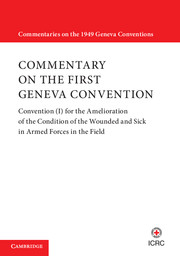 Commentary on the First Geneva Convention
Commentary on the First Geneva Convention Published online by Cambridge University Press: 06 January 2017
When the original Commentary on the First Geneva Convention was written in 1952, the horrors of the Second World War were still fresh in people's memory, but so was the humanitarian spirit that prevailed at the 1949 Diplomatic Conference and that made the adoption of the Geneva Conventions possible. More than 60 years later, we find ourselves confronted with a similar contradiction.
On the one hand, we are witnessing an increasing fragmentation and complexity in today's armed conflicts, which are often characterized by disregard for the law. The misery they engender – the suffering of children, the despair of families trapped in sieges or forced from their homes, the abuse of the wounded and sick – is brought daily to our attention through different media channels. On the other hand, the community of States has agreed on a stronger and more comprehensive normative legal framework than ever before. We know that the values that found expression in the Geneva Conventions have become an essential part of our common heritage of humanity, as growing numbers of people around the world share a moral and legal conviction in them.
These contradicting realities challenge us to act: to react to the suffering and violations of the law, and to prevent them from occurring in the first place.
In these efforts, it is part of the ICRC's role and mandate to work towards a common understanding of international humanitarian law through engagement with all stakeholders, including political and religious leaders, key opinion and policymakers, academic circles, the judiciary and, last but not least, weapon bearers.
With this updated Commentary on the First Geneva Convention, the ICRC presents a new tool for practitioners and scholars, as part of our joint endeavour to close the gap between the law as it stands and the law as it is applied on the ground.
We know that the first editions of the Commentaries on the four Geneva Conventions have been useful for military and civilian practitioners as well as for judges and academics. A lot of time has passed since the first editions were published, and we have gained a great deal of experience in applying and interpreting the Conventions in contexts very different from those that led to their adoption.
To save this book to your Kindle, first ensure [email protected] is added to your Approved Personal Document E-mail List under your Personal Document Settings on the Manage Your Content and Devices page of your Amazon account. Then enter the ‘name’ part of your Kindle email address below. Find out more about saving to your Kindle.
Note you can select to save to either the @free.kindle.com or @kindle.com variations. ‘@free.kindle.com’ emails are free but can only be saved to your device when it is connected to wi-fi. ‘@kindle.com’ emails can be delivered even when you are not connected to wi-fi, but note that service fees apply.
Find out more about the Kindle Personal Document Service.
To save content items to your account, please confirm that you agree to abide by our usage policies. If this is the first time you use this feature, you will be asked to authorise Cambridge Core to connect with your account. Find out more about saving content to Dropbox.
To save content items to your account, please confirm that you agree to abide by our usage policies. If this is the first time you use this feature, you will be asked to authorise Cambridge Core to connect with your account. Find out more about saving content to Google Drive.